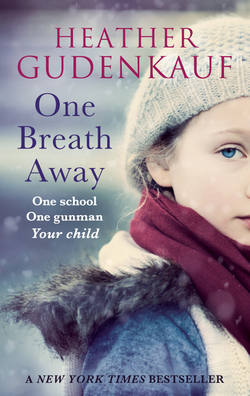Читать книгу One Breath Away - Heather Gudenkauf, Heather Gudenkauf - Страница 13
Mrs. Oliver
ОглавлениеMrs. Oliver hardly dared to look away from the stranger standing in front of her, but the cries of her students pulled her gaze away from the man who looked vaguely familiar.
Sixteen of the seventeen children were helplessly staring up at Mrs. Oliver, some with tears in their eyes, waiting for direction as to what to do. The monthly tornado and fire drills had done nothing to prepare them for this. Not even the Code Red Lockdown drills could have readied them for the surprisingly calm, albeit slightly manic-looking man dangling a gun from his fingers. Only one child, P. J. Thwaite, the son of one of her former students, Holly Thwaite, was peering raptly at the man, scanning his face, not as if he knew him, but as if maybe, at one time, he had seen him somewhere before. The man stared back at P.J., his expression flat and unemotional, which unnerved Mrs. Oliver even more.
As a classroom teacher Mrs. Oliver couldn’t begin to count the number of times she had needed to appear unruffled and completely in control. There was the time, her first year teaching no less, when seven-year-old Bert Gorse, on a dare, decided to climb to the top of the tall steel slide and try to jump and grab onto the branch of a nearby maple tree. Mrs. Oliver remembered watching in horror from her position across the playground as Bert leaped into the air, his eyes screwed shut, his hands reaching for the branch, fingers clawing at the rough bark. “For God’s sake!” she yelled before she could stop herself. “Open your eyes!” Unable to grab the limb, Bert fell twelve feet to the hardscrabble earth below. Calmly, she told the little girl standing next to her to run as fast as she could to get help.
“You swore,” the girl breathed in disbelief.
Mrs. Oliver bent down and put her face so close to the little girl’s she could smell the peanut butter sandwich the child had eaten for lunch and said in the low, even tone that children for the next forty years would know to take seriously, “Run.” Trying not to wobble in her new high heels, Mrs. Oliver made her way as quickly as possible over to Bert, who was sprawled out on his belly, unmoving. The knot of terrified boys who surrounded Bert began unraveling at her approach. “Go stand next to the building,” she ordered, and the boys obeyed at once. Mrs. Oliver knelt down, the knees of her brand-new polyester pantsuit grinding into the dirt. Bert’s eyes were open but glazed over with pain or shock. “Not dead!” Mrs. Oliver said joyfully, and behind her the children erupted with a soft whoosh of relief. “Are you okay, Bert?” she questioned, but Bert’s mouth could only open and close soundlessly like a fish on dry land. “Got the wind knocked out of you?” she said in her smooth, low manner that the children found reassuring. Mrs. Oliver maneuvered herself onto her stomach and lay next to Bert so she could better see his pale, pinched face and where he could see her round, placid one. “It’s going to be just fine, Bert. Just lie still now until help comes,” she said soothingly.
Bert was okay, although he ended up with two broken arms and a collapsed lung. Once Bert regained the use of his hands, he wrote his teacher a lovely letter in his messy cursive, thanking her for waiting with him until the ambulance arrived. Mrs. Oliver still had that letter, now framed and hanging in the room that her grown daughter, Georgiana, called the Shrine to Mrs. Oliver. Bert Gorse was now a fifty-year-old banker who lived in Des Moines with his wife and three children. Through the years, Mrs. Oliver remained steadfast in her belief that a teacher needed to be calm and in control under any circumstance. Certainly unlike Gretchen Small, the young fifth-grade teacher, who began to hyperventilate when the fire alarm accidentally went off.
Mrs. Oliver straightened her spine, cleared her throat and willed her voice to emerge strong and clear. “What do you want?” she demanded, stepping between P.J. and the man with the gun.
